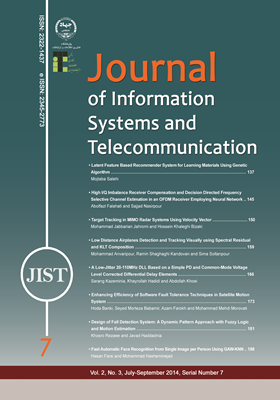A Low-Jitter 20-110MHz DLL Based on a Simple PD and Common-Mode Voltage Level Corrected Differential Delay Elements
محورهای موضوعی : Communication Systems & DevicesSarang Kazeminia 1 , Khayrollah Hadidi 2 , Abdollah Khoei 3
1 - Urmia
2 - Urmia
3 - Urmia
کلید واژه: Delay Locked Loop, Clock Generation, Low-Jitter Clock Distribution, Wide-Range DLL, Low-Jitter DLL,
چکیده مقاله :
In this paper, a 16-phases 20MHz to 110MHz low jitter delay locked loop, DLL, is proposed in a 0.35µm CMOS process. A sensitive open loop phase detector, PD, is introduced based on a novel idea to simply detect small phase differences between reference clock and generated delayed signals. High sensitivity, besides the simplicity reduces the dead zone of PD and gives a better jitter on output generated clock signals, consequently. A new strategy of common mode setting is utilized on differential delay elements which no longer introduce extra parasitics on output nodes and brings the duty cycle of generated clock signals near to 50 percent. Also, small amplitude differential clock is carefully transferred inside the circuit to considerably suppress the noise effect of supply voltage. Post-Layout simulation results confirm the RMS jitter of less than 6.7ps at 20MHz and 2ps at 100MHz input clock frequency when the 3.3Volts supply voltage is subject to 75mVolts peak-to-peak noise disturbances. Total power consumption reaches from 7.5mW to 16.5mW when the operating frequency increases from 20MHz to 100MHz. The proposed low-jitter DLL can be implemented in small active area, around 380µm×210µm including the clock generation circuit, which is proper to be repeatedly used inside the chip.
In this paper, a 16-phases 20MHz to 110MHz low jitter delay locked loop, DLL, is proposed in a 0.35µm CMOS process. A sensitive open loop phase detector, PD, is introduced based on a novel idea to simply detect small phase differences between reference clock and generated delayed signals. High sensitivity, besides the simplicity reduces the dead zone of PD and gives a better jitter on output generated clock signals, consequently. A new strategy of common mode setting is utilized on differential delay elements which no longer introduce extra parasitics on output nodes and brings the duty cycle of generated clock signals near to 50 percent. Also, small amplitude differential clock is carefully transferred inside the circuit to considerably suppress the noise effect of supply voltage. Post-Layout simulation results confirm the RMS jitter of less than 6.7ps at 20MHz and 2ps at 100MHz input clock frequency when the 3.3Volts supply voltage is subject to 75mVolts peak-to-peak noise disturbances. Total power consumption reaches from 7.5mW to 16.5mW when the operating frequency increases from 20MHz to 100MHz. The proposed low-jitter DLL can be implemented in small active area, around 380µm×210µm including the clock generation circuit, which is proper to be repeatedly used inside the chip.


